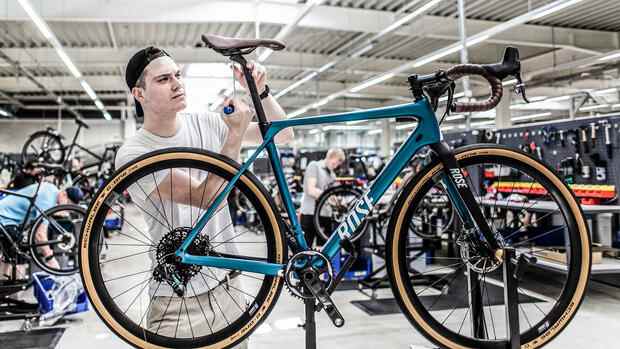In the middle of the consumer crisis, the company lowers prices.
(Photo: ROSE Bikes GmbH)
Dusseldorf After years of boom, the gloomy consumer mood is also affecting the bicycle industry. “Customer interest is still high, even more than last year,” reports Thorsten Heckrath-Rose, co-owner and managing director of the bicycle company Rose Bikes. “But we also sense a reluctance to buy, it takes much longer for the customer to decide to make a purchase.”
In order to stimulate targeted purchases again, the bicycle manufacturer is now reducing prices by an average of 15 percent. “Consumers now need the confidence that everything is not always going to be more expensive,” explains Heckrath-Rose in an interview with the Handelsblatt.
The declining consumer sentiment is affecting the entire industry. “In terms of bicycle sales in Germany, a reluctance to buy has been noticeable in recent weeks with rising inflation, especially in the lower price ranges,” the German Bicycle Industry Association (ZIV) recently announced. Customer reluctance can also be felt in the spare parts business.
Rose Bikes increases sales by 17 percent
The online bicycle retailer Bike24 also spoke of a “challenging environment” and “clouded consumer sentiment” when presenting the half-year results. In the German-speaking market, sales fell by seven percent in the second quarter.
Top jobs of the day
Find the best jobs now and
be notified by email.
Rose Bikes can at least approach this market slowdown from a position of strength. In the fiscal year that ended in October, the company was able to increase sales by 17 percent to EUR 174 million, as Heckrath-Rose explains. “We have set ourselves ambitious goals and we have always achieved them,” he says.
>> See also: The boom on two wheels in three graphics
As a result, Rose Bikes grew faster than the market. According to figures from the ZIV, sales of bicycles and e-bikes increased by two percent to around 6.56 billion euros last year. In the first half of 2022, sales remained stable. In 2020, sales had increased by 61 percent.
Listen to the “Rethink Work” podcast here: From Hartz IV child to entrepreneur
However, a large part of the increase in sales in the industry is due to rising prices. The comparison portal Guenstiger.de determined that bicycles without an electric drive were 15 percent more expensive in 2021 than in the previous year. For e-bikes, prices rose by more than 40 percent. Rose Bikes only increased the prices for its bikes again at the end of March 2022, by an average of ten percent.
This was mainly due to the delivery difficulties for bicycles and spare parts. This led to cost increases in almost all areas: high raw material prices, resulting in rising prices for frames and components, sharply rising freight costs, interrupted supply chains, resulting in underutilized production capacities, high proportions of train and air freight.
Additional costs due to chaos in the supply chains
“Until now, our biggest concern was being able to build wheels at all,” reports the entrepreneur. Due to a lack of parts deliveries from Asia, Rose was only able to use half of its production capacity this summer. He often had to buy parts on the spot market for a lot of money at the last minute in order to be able to deliver.
>> Read here: Everything more expensive? Are you kidding me? Are you serious when you say that! Refrigerators, books, mobile phones – where you should strike now
“In the past few years we have had chaos in the supply chains, there was a lack of transparency as to when which part was available and at what prices I could get it,” the Rose boss recalls. Because this situation has returned to normal, the manufacturer now has the opportunity to save costs through process improvements. “With the price reductions, we are also making a bet on the potential that we can leverage there,” says Heckrath-Rose. “We now have the courage to take this step.”
In order to reduce dependence on Asia somewhat, the industry’s goal is to shift more parts production to Europe. In Portugal, for example, production facilities are now being set up. “But it’s not easy to reach the quality level of manufacturers from Asia,” observes Anatol Sostmann, who is responsible for product and brand at Rose Bikes. “That is a challenge.”
But he also sees an advantage in this. “When we relocate production, we have the opportunity to think about completely new manufacturing methods,” says Sostmann. “We see opportunities there to bring innovations into the mass production of bicycles.”
More: Bicycle manufacturer Woom wants to produce in Europe again – but encounters problems
